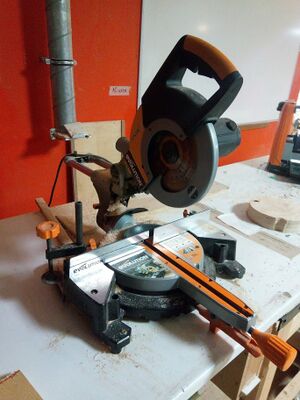Equipment/CompoundMitreSaw
A new sliding compound mitre saw (with much larger cutting capacity and in generally better condition) was donated in December 2021 replacing the original that was listed on this page
Saw Blade can be angle to support different cut and longer cut using back and forth movement.
No training requirement, but please seek advice from other woodshop users if you are unfamiliar with its use
Note - this type of saw is designed to cut metal as well as wood, and it is currently fitted with a combination blade. However it does not cut metal very well and using it in this way quickly dulls the teeth so they leave a poor finish on wood - the Donkey Saw is a better tool for metal cutting
Instructions for the old mitre saw (not an exact match for the current model, but still useful for reference) can be found below
Maintenance and Cleaning Instruction
Ensure to connect the vacuum cleaner when you cut a part preventing the wood dust to spread.
Supplemental manual for changing saw blade
Risk Assessment - Mitre Saws
This risk assessment is intended to provide guidance on the risk associated with the above equipment and activities in normal use. Please also check general risk assessments for the space as a whole. Any discrepancies, errors or concerns should be raised with the document maintainers or trustees - do not edit this assessment directly. For responsible persons and last update, see 'version log' of the assessment page.
Activity
Cutting material with a mitre saw
Signage
Understanding Risk Rating
LOW - Ensure current control measures are in place and continue with activity
MED - Control measures may be adequate, co-supervision is recommended
HIGH - Do not undertake activity without further consultation with area specialists
Risk Assessment
| Identify Hazards | Who May be Harmed and How | Severity | Control Measures | Likelihood | Risk Rating |
|---|---|---|---|---|---|
| Incompetent user | User, Bystander | HIGH | Users must not use tools that they are not competent to use. Members must challenge use that they believe is dangerous. Users must read the user manual where applicable. Users must read the risk assessment before using a tool. Users will be advised during induction which tools they will need supervision or an induction to use. Only authorised members will complete maintenance and calibration tasks. | LOW | MED |
| Contact with blade | User | HIGH | Do not put hands into exclusion zone. Clamp small work pieces to avoid contact with hands close to the blade. Saw should be turned off immediately after use Saw blade should stop within 10 seconds of being turned off. | LOW | MED |
| Drawing in (being pulled into the saw) | User of the tool | HIGH | User of the saw should not wear gloves, ties, scarves, or other long flowy clothing that could get pulled into the blade. Do not move hands past the blade | LOW | MED |
| Dust (inhalation, fire, explosion) | User of the tool, users of the room, the space. | MED | Maintenance must include the cleaning of dust from within the saw housing where accessible. A respirator or mask should be used whilst operating this tool for prolonged periods. | LOW | LOW |
| Blade snatching or jamming | User, bystanders | HIGH | Only cut wood and plastic on the mitre saw Ensure a visual inspection of the mitre saw is undertaken before every use, checking for physical obstructions | LOW | MED |
| Noise | User of the tool, users of the room. | MED | Ear protection is advised. | LOW | LOW |
| Flying splinters | User of the tool, users of the room. | HIGH | Eye protection must be worn In the workshop | LOW | MED |









